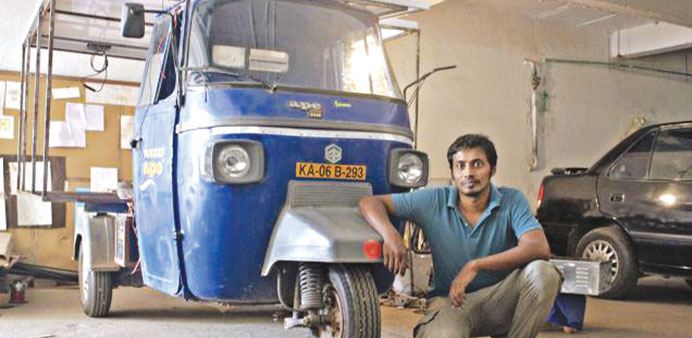IANS/Bangalore
An Indian techie will soon embark on a trans-national expedition riding on a self-built solar-powered auto-rickshaw to Britain to promote a sustainable low-cost alternative transport solution and check air pollution in towns and cities across the country.
“The objective of this 10,000km adventure through 10 countries is to demonstrate the environmental and economical benefits of using a solar-powered auto-rickshaw, a popular transport mode in South Asia used for commuting by ordinary folks,” 33-year-old engineer-turned green activist Rabelli Naveen said.
Though Naveen initially planned to drive the three-wheeler prototype through Pakistan and Afghanistan to Iran on way to Britain via Turkey, Bulgaria, Serbia, Hungary, Austria, Germany and France, he will travel with the vehicle by ship to Iran in the first leg of the expedition, as he does not have a visa from the two neighbouring countries.
“As visa is issued on arrival in the rest of the countries, I will drive from Teheran to Paris through Istanbul, Belgrade, Zagreb, Budapest, Salzburg and Munich and use a ferry to reach London in over three months, travelling about 100km a day,” Naveen said.
After graduating in B Tech from Hyderabad a decade ago, Naveen went to Australia for masters in electronics and worked in Melbourne long enough to acquire its citizenship and passport to travel across countries without hassles.
“Apart from difficulty in getting a visa, I have been advised that it is unsafe to travel on road through Pakistan and Afghanistan for security reasons. Hence, after driving to Mumbai from here, I will board a ship with the solar auto ‘Tejas’ to reach the Iranian port Bandar Abbas in five days and resume the journey on land,” Naveen said.
Raoul Kopacka, 26, an Austrian automobile engineer and a videographer, will accompany Naveen on the long trip to make a documentary of the expedition to show how road worthy and safe the solar powered auto is with zero emission.
“We look forward to meeting lots of people with diverse cultures and from various walks of life to understand their efforts towards a sustainable lifestyle,” Kopacka said during a test-drive in the ‘tuk tuk’, as autos are known in Southeast Asian cities.
Naveen fancied embarking on this mission inspired by an Austrian team, which drove across the world in a solar powered taxi during 2008-09.
“We plan to share our experiences and learning from the long journey with others online so that the data can be used to create awareness for switching over to renewable energy from non-renewable energy like fossil fuels,” Naveen said.
The two plan to hit the road in the next six months after getting fitness certification for Tejas, regulatory approvals and funds (Rs2.5mn) through sponsors, corporate and organisations involved in promoting sustainable solutions for protection of global environment.
“We are in the process of getting the retrofitted auto certified by the Automotive Research Association of India and clearances from the road transport organisation, as it has logged about 2,000km on test drives to test its vital parameters and assess its fitness with endurance to ride on electric power and solar energy,” Naveen said.

